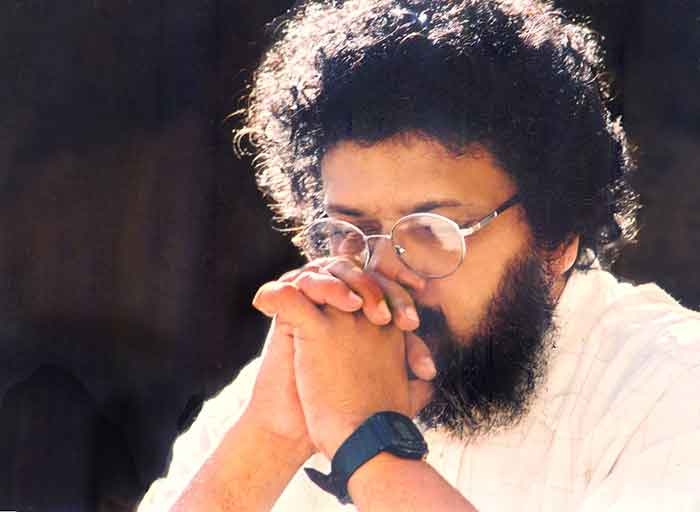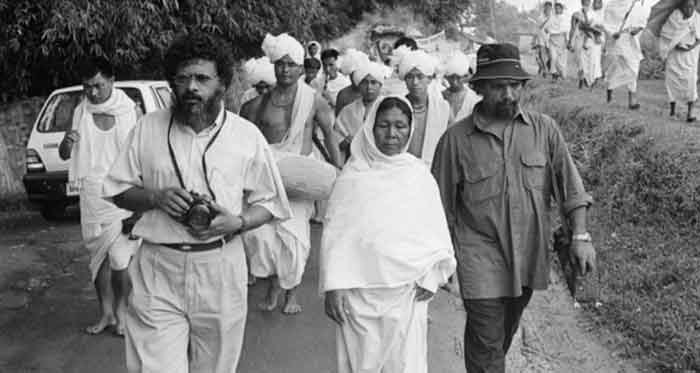
Razak Kottakkal is identified with artistic photographs. Almost everyone ~ living or otherwise ~ connected with Malayalam literature insisted on accompanying their works with photographs taken by Razak. Writers grew old but they continued to use pictures taken in their youth. Their age was frozen by Razak forever. Razak’s black-and-white pictures of the greatest Malayalam writer (according to me), Vaikkom Mahamad Basheer, are stunning. By the time he started photographing Basheer was old ~ an apology to the younger, smarter Basheer. Razak played with shadow and geometry in his pictures. Basheer humorously once said that looking at his photographs he felt like a strange beast, framed. The comment reached Razak. He decided not to show the beastly and more poetically geometric pictures to Basheer while he was alive. Basheer and Razak maintained a good rapport.
I met Razak where Adoor Gopalakrishnan’s Kathapurushan (Man of the Story) was being filmed. I was somehow accommodated by Adoor as assistant director, although no directorial assistance ~ in the sense the film industry understands ~ was ever at play. That is another story for another occasion. Razak and I clicked on the very first day and stayed together through the entire shoot.
Razak is a memory now. But Razak filled me ~ while I was watching a great short film, Decisive Moment ~ with the voice-over of Cartier Bresson overlapping his classic photographs. I watched it once again. Razak came through stronger. By the way, Razak’s windows to the world were Malayalam, a little broken Hindi and the universal language of the visual arts. Do not confuse him with a “globalised photographer with localised cultural significance”. I’m going to prevail on Bresson intermittently in my article.
Camera-it can be a machine gun, it can be a psycho-analytical couch, it can be a warm kiss, it can be a sketch book ~ the camera.
Razak was soft spoken even in his frenzy. An intoxicated Razak was an extra-terrestrial being. And I’ve heard the above-stated words about the camera in its different avatars in Malayalam at unearthly hours almost 25 years ago. Adoor Gopalakrishnan was shooting in his native place for more than a month. Other than Adoor and his favorite cameraman Mankata Ravi Varma, Razak was the only person privileged to look through the viewfinder. Adoor always insists his still photographer to stick to the same frame and angle of the movie camera.
Razak successfully completed his assignment. With Adoor’s permission he started framing the director at work. Razak alone was the scriptwriter, director of photography and director. He was using an analogue camera and had to wait at least for a week to get them processed. When night falls he becomes an ET and I a semi-terrestrial being to whom he would pour his heart out: his disappointment with the “official” movie camera frame and the excitement with his “unofficial” independent frame. I was with Razak’s independent image, although we both were yet to see the print. I was perturbed by the reality that while Adoor was having the whole picture within him, we two anarchists had access to individual frames only… So, how can Razak show me a better angle through his camera? When the first bunch of photographs arrived, I saw a parallel narrative progressing almost in stylistic conflict with the official storyline. Perhaps the memories of his earlier experience with Basheer disturbed him. He did not show the ultra-shadowy and geometric pictures to Adoor for quite sometime until he had gathered courage. Adoor, like Basheer, understood the artistic anarchy.
I decided to work with Razak as a cinematographer for my films and we worked together on a number of films. On several occasions we quarrelled on “individual” and “collective” characteristics of shots. The collectivity of shots were sometimes decided by the individual magic of frames, which Razak showed me beforehand. My visual orientation was altered by Razak.
“You have to forget yourself. You have to be yourself and forget yourself. So, the image comes much stronger of what you want and what you seek”
It’s like hearing Cartier Bresson recently. Poets are human beings who confront that mundane “daily-ness of life” like all of us. But they articulate your thoughts which you fail to. You identify with them as yours and the journey becomes an inch more lucid. I have to write about meeting one more such individual, who is a practising editor in Kolkata ~ Sumit Ghosh. Sumit never spoke to me like Bresson. But he saw through me in my moments of artistic anxiety. Once the film was shot with Razak, I was in search of an editor. I chanced upon Sumit. We worked together on several films. I will continue to work with him until we are done with each other. But Sumit never got any recognition from the establishments of fiction or non-fiction films. I do not know why.
The story of the absence of any official recognition for an excellent editor like Sumit Ghosh is more fictitious than fictional or non-fictional. Outstanding people are standing out, especially when they are of a silent type, like Sumit.
Yes, yes, yes. These are the last three words in James Joyce’s Ulysses with which Cartier Bresson’s film ends. He says that it is an affirmation. When I was stuck at a poignant and poetic juncture of my filmWalking Dead and lost my way, Sumit picked up an NG shot and solved the puzzle. In the evening Banaras Razak was shooting a flock of white birds flying against the divine sky. A building obstructed the possibility of further camera movement as the birds flew behind the building. Camera had to wait at the blank sky, expecting the return of the of flock. Sumit used that blank shot… Poet Kedarnath Singh deserved a Sumit Ghosh…
Have you ever witnessed how
The spring descends in an empty bowl ?
This city unfolds this way
Thus it fills and
Then it empties out.
To conclude, let me share a Tagore story. At night the light goes off and the child could not see her mother. In an ordinary writer’s hand it would have become yet another ordinary story. Tagore’s child did not mouth a Himalayan philosophical dialogue which made the story a classic. The child simply asks ~ “Mother, where am I ?” Yes. Yes. Yes. Razak Kottakal and Sumit Ghosh are poets in their own right… they helped me forget myself and helped me to be myself, even today…
There are no new ideas in the world. There are only new arrangements of things.
Joshy Joseph is a filmmaker and writer
SIGN UP FOR COUNTERCURRENTS DAILY NEWSLETTER












































